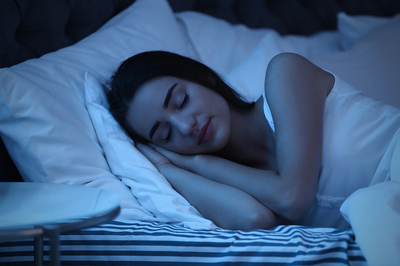
An insomnia-free life is possible for people in addiction recovery, but it can take time to get there.
“From alcohol to opioids, most addictive substances can induce sleep disturbances that persist despite abstinence and may increase the risk for relapse,” says research published in the academic journal, Current Psychiatry. Not only that, nearly all FDA-approved sleep medications are controlled substances which, while safe for use by most people, can be dangerous territory for people in addiction recovery.
The good news? A good night’s sleep is possible without habit-forming medications. Here’s a closer look at the link between addiction and sleep disturbances, along with tips for improving your sleep health.
The Link Between Addiction and Insomnia
Many addicts and recovering addicts suffer from insomnia. In fact, more than half of people undergoing treatment for alcohol dependency report symptoms of insomnia. Drugs including nicotine, marijuana, cocaine, and other stimulants have also been associated with sleep disruptions.
Think your addictions are causing your insomnia? Think again. In fact, the relationship between addiction and insomnia is much more complex. In fact, according to one sleep study, boys between the ages of three and five whose mothers report sleep problems are more likely to use alcohol and drugs by ages 12 to 14.
Another study revealed that alcohol use disorders in people without psychiatric disorders were twice as likely to occur in people with persistent insomnia.
Concludes Current Psychiatry of the phenomenon, “Thus, insomnia may increase the risk for early substance use.” Several factors may be to blame, including the tendency to self-medicate and the development of tolerance. The more people use substances to produce sleep, the more they need — thereby increasing the risk for dependence.
While substance abuse can cause insomnia complaints, other factors may also be involved, including other illnesses, sleep-impairing medications such as antidepressants, dysfunctional beliefs about sleep, and poor sleep hygiene.
Meanwhile, even though abstinence can lead to improvements with substance-induced sleep problems, issues may still persist months and years into recovery due to the lingering effects of chronic substance abuse on the brain, according to SAMHSA.
Tips for Better Sleep
Speaking of sleep hygiene, there are some things insomniacs can do to set themselves up for a better night’s sleep, starting with stimulus control. Progress In Behavior Modification sets for the following seven steps:
- Get into bed to sleep only when you’re tired and feeling sleepy.
- Avoid using the bed for non-sleep-related activities, such as reading, watching television, and eating. (Sex is the only exception.)
- If you don’t fall asleep within 20 minutes, get out of bed and move to another room. Return to bed only when you’re sleepy.
- While not in bed at night, engage in only quiet and calm activities that keep your interest. Avoid eating, smoking, and warm baths and showers. Refrain from lying down and/or falling asleep outside of your bed.
- When you are tired, return to bed. If you still can’t fall asleep, repeat the third step. Repeat as often as necessary throughout the night.
- To promote a healthy sleep-wake rhythm, wake up at the same time every morning regardless of how much sleep you got the previous night.
- Refrain from napping during the day.

Both exercise and sunlight can help promote better sleep at night.
In addition to stimulus control, elements of cognitive-behavioral therapy for insomnia include sleep restriction, sleep hygiene, and cognitive therapy, which seeks to identify and explore beliefs that can lead to anxiety about sleep, such as unrealistic self-expectations and faulty beliefs about sleep-promoting practices.
Speaking of sleep hygiene and sleep-promoting practices, these include establishing a consistent sleeping and waking schedule, creating a quiet, dark relaxing and cool sleeping space, removing all electronic devices from the bedroom, avoiding large meals and caffeine before bedtime, and exercising earlier in the day, according to the CDC.
Remember, while it can take time to establish healthy sleep patterns, the benefits of good sleep are profound both in terms of your recovery outlook and overall quality of life.
One last thing to keep in minds, according to Current Psychiatry? “Treating insomnia without treating addiction may improve sleep but worsen addiction.” Enter Harris House. This leading St. Louis drug rehab treatment center adopts a holistic approach to substance use recovery, including the use of cognitive-behavioral therapy to address the underlying causes of both addiction and insomnia. Call us today to learn about admissions.







